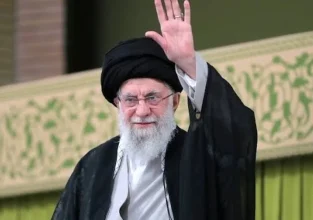Syrian rebels oust president Assad, call for free elections amid seismic Middle East shift

In a historic turn of events, Syrian rebels have toppled President Bashar al-Assad, ending over 13 years of his family’s autocratic rule. The rebels seized control of Damascus on Sunday, marking a critical moment not just for Syria but for the broader Middle East, where the power dynamics of Russian and Iranian influence are now significantly disrupted.
Syria’s army command informed its officers that Assad’s regime had ended, according to sources. Despite this, the military announced it would continue operations against “terrorist groups” in key cities like Hama, Homs, and Deraa. Assad himself reportedly fled Damascus early Sunday to an undisclosed location, as rebels took over the capital without encountering significant army resistance. However, unconfirmed reports suggest Assad may have perished in a mysterious plane incident after a Syrian Air aircraft abruptly disappeared from radar.
Also Read:
Across Syria, jubilant crowds gathered to celebrate the regime’s collapse. In Damascus, thousands waved flags and chanted “Freedom” after decades of Assad family rule. In Homs, which had long been a site of brutal conflict, residents took to the streets chanting, “Assad is gone, Homs is free.” Rebels also freed thousands of prisoners from detention facilities, including Sednaya prison on the outskirts of Damascus, which symbolized the repression of Assad’s era.
The Syrian rebel coalition announced plans to transfer power to a transitional governing body with full executive authority. Rebel commander Abu Mohammed al-Golani, leader of Hayat Tahrir al-Sham (HTS), emphasized the need for an orderly transition, avoiding the chaos witnessed in post-Saddam Iraq. Prime Minister Mohammad Ghazi al-Jalali echoed this sentiment, calling for free elections to allow Syrians to shape their political future.
Despite these declarations, stabilizing the newly captured western areas of Syria remains a significant challenge. HTS, formerly affiliated with al-Qaeda, is Syria’s strongest rebel group and a critical player in the transition. However, its history raises concerns among Syrians and international observers about potential reprisals or draconian governance. Countries like the United Arab Emirates and Egypt, staunch opponents of extremist groups, are wary of HTS’s influence in the emerging government.
The dramatic fall of Assad’s regime has dealt a blow to Russia and Iran, his primary backers throughout Syria’s civil war. Their waning influence has created a vacuum of uncertainty in the region as conflicts continue to rage across the Middle East. Syria’s collapse follows years of war that killed hundreds of thousands, displaced millions, and turned cities into rubble.
The swift rebel advance has stunned the world, with Arab capitals fearing a new wave of instability. For Western governments, the immediate task is deciding how to engage with the emerging administration, particularly one where a previously designated terrorist group plays a pivotal role.
Read all the Breaking News Live on pakistantimes.com and Get Latest English News & Updates from Pakistan Times. Follow us on Whatsapp channel for more.









